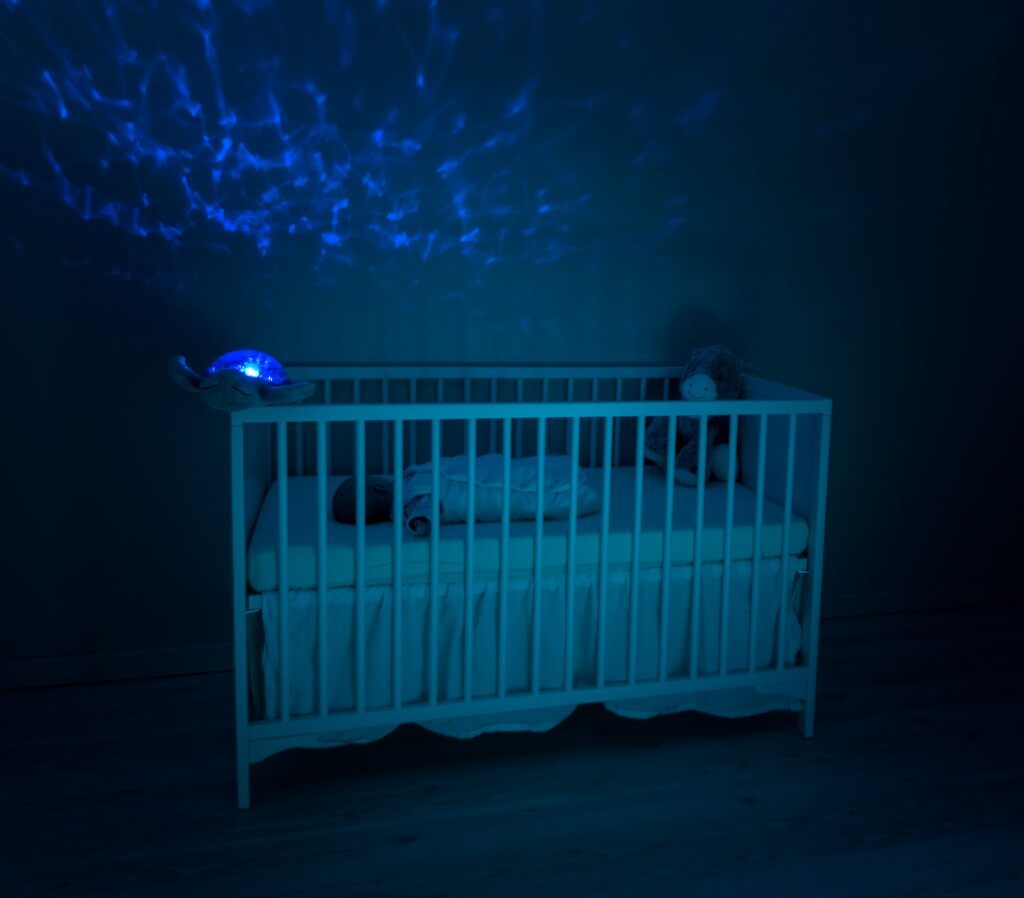When do babies start sleeping through the night? It is a common question faced by all parents after your baby is born and you are sleep deprived due to frequent night feeding. In this article, you will learn some useful tips on how to make your baby sleeps longer hours at night.
Your little one is finally here, bringing you all kinds of joy. Seeing them smile for the first time or the feeling of your baby squeezing your finger are simply a few of the many ways your baby makes you so happy. Just one problem, though – you are sleep-deprived. You’ll need some techniques and a lot of luck to get your baby to sleep through the night.
It is impossible to schedule our lives for the first six months of their lives. This is because babies have sporadic sleep patterns. They can’t figure out time just yet. Sure, people advise us to sleep when the baby sleeps. If only it’s that easy.

When do babies start sleeping through the night?
For babies who are still need to be fed 2-3 times at night, seems to be impossible to sleep through the night as yet due to hunger. Frequent feeding at night means frequent waking. Therefore, in order to help them sleep through the night, you must decrease the number of these feeding. How to go about this? Do not expect your baby will give up the night feeding , all of a sudden.
Before we dive in to the answer, let us understand why some babies can’t sleep through the night yet.
1. Your baby needs to be fed.
A newborn does not eat that much yet in a single feeding. But you just fed him a couple of hours ago? Well, milk is digested pretty quickly, so babies easily get hungry and thirsty. Since they can’t feed themselves yet, they’ll need you to wake up and do it for them.

2. Your baby can’t figure out day and night yet.
Babies got a reversed schedule. They sleep during the day and get awake in the evening. It can be exhausting for mothers who would rather sleep in the evening.
3. Teething.
Most babies start teething at around six months, which might prevent them from sleeping through the night.
4. The sleeping environment is uncomfortable.
Watch the temperature in your baby’s sanctuary, and make sure it’s not too hot or too cold. It will also be great to invest in blackout curtains when it’s still bright when you put them to sleep. A baby sound machine might help too.

Babies sleeping pattern
There’s no one size fits all, but it depends on several factors from the baby’s weight, age, whether you are breastfeeding or using formula, plus the nighttime feeding habits. Here’s a guide on what to expect during the first six months:
Newborn: Newborns need to eat every two to four hours so it’s impossible for babies to sleep through the night.
2 – 3 Months Old: At this period, they can sleep up to five to six hours, but it does not mean babies can sleep through the night. Babies still need one to two feedings during the night, especially if you are nursing.
4 Months Old: Babies have reached the good weight of eleven pounds, which means they don’t need to be fed at nighttime anymore. Sometimes, they might still demand one, but the good news is they can finally sleep for seven to eight hours.
5 – 6 Months Old: Finally, babies can sleep through the night. If he ever wakes up at night to eat, it does not mean that he’s that hungry. Check with your doctor on how to cut the nighttime feedings in a healthy way slowly.
Breastfed versus Formula-Fed Babies
These two can have different sleeping patterns. One study shows that babies who are formula-fed sleep through the night at the end of their third month. They wake less often and take more naps. That’s because formula milk takes more effort and time to digest.
While, if you are breastfeeding, your baby might feel hungry more often because breastmilk moves faster into their digestive system. Thus, babies who are breastfed can absorb the nutrients easily. However, it also means they’ll wake up through the night so they can be fed.
Of course, experts agree that the latter is better even if it leads to temporary sleep problems. The risk of diarrhea and infection is lower with breastmilk. We recommend checking with your doctor to check the best strategy for you.
How to help your child start sleeping through the night?
Two things need to be addressed. Reduce or eliminate the night time feeding and second is to teach your child new sleep associations so that he can fall asleep without being held, without eating, and without sucking on the breast or bottle. You can do these things at the same time, or one at a time. It is best to do this gradually and get advice from sleep expert on proper way to do it.
Get Your Baby Sleep Through the Night with the Following Tips:
You don’t have to wait for six months to encourage longer nighttime sleep. Your sleep and health are at stake, too, so try out the following tips to get your baby to sleep through the night:
- Feed them during the day. Keeping the calories coming during the day will make your baby less hungry through the night.
- Get your baby to dream feed before you go to sleep. Wake him enough as you feed your baby. Try not to do this when he’s lying down. Getting him to a few sips can lead to an extra hour or two of sleep.
- Let your baby self-soothe. Take your time to attend to your baby once they start whimpering at night. Instead, give him a chance to get himself back to sleep.
- Start a bedtime routine. It will relax and comfort them, a signal that it’s time to go to bed. Perhaps you can start with a nice, warm bath, a little cuddle, and some lullaby, and finish with a full feeding.
- Unless it’s necessary, try not to change the diaper in the middle of the night. Shall you need to, do it with dimmed lights and less noise as possible.
It is impossible to put a regular sleeping schedule until babies reach three to six months old, so better not to rush your baby as it might interfere with his growth.
Don’t worry because your little one will develop his own sleeping schedule sooner or later, and your baby can sleep through the night. Most importantly is having them sleep or nap twelve to sixteen hours every 24 hours for healthy growth.
Interview of Mary-Ann Schuler Baby sleep training expert
Last but not least, I have included an interview of Mary-Ann Schuler, a child psychologist and world renowned baby sleep training expert, her advice about efficient method to put any baby to sleep. I have just copied the important message she tried to convey related to this topic. This interview is derived with permission from babysleepmiracle.com.
Reporter: If you were to choose a word to describe the process of sleep training a baby, which one would it be?
Mary-Ann: Rewarding.
Reporter: Wow! I’m convinced that parents love hearing that. Can you tell me exactly what you mean by “rewarding”?
Mary-Ann: Yeah, sure. Rewarding in the sense that babies and parents are equally benefiting from it. The reward is a good night’s sleep for both.
Reporter: And if parents want very fast results?
Mary-Ann: The truth is, nothing ever happens overnight. They need to remember that consistency and persistence are the keys here.
They are the building materials that support the whole structure. Take one out and the building falls to the ground.
Reporter: How about positivity? Is it important?
Mary-Ann: Surprisingly, children can sense if you’re truly happy. In other words, if you’re not happy when you’re teaching them, they won’t be happy learning from you.
Reporter: There is an old debate if children need to cry out until they fall asleep or not? What do you think of this?
Mary-Ann: I have to admit this is among the most common questions I receive. The short answer is no. Children shouldn’t be left alone crying out until they fall asleep.
The reason for this is simple: children need affection. If they don’t receive it now, they won’t show it back later in life. Affection, however, doesn’t mean rocking them to sleep every night.
The good news is that there is a third way, which is both soothing and efficient. I describe it in detail in my book.
Reporter: You wrote the book on how to sleep train every child. If parents pick it up, can they really have a sleeping child in a short amount of time?
Mary-Ann: As I clearly explained in the book, each child is unique and there are certain differences between each developmental phase. You can’t sleep train a 2-month old baby in the same way you would train a 1-year old. In general, any baby can be trained in a short amount of time, but it all depends on a parent’s consistency in following the routine.
Reporter: What is the shortest time someone has ever sleep trained their child using your method?
Mary-Ann: I receive mails from parents telling me they achieved fast results on a daily basis, but the most amazing mail I read was from a very happy mom who told me that she managed to sleep train her baby in three short days.
Related post ” Baby sleep advice“


Very interesting. I am now a mother of 21 and 19 now. But I did not have the liberty to read one like this. Besides being busy for out of town work with daily travel, social media gadgets were just then booming and my family was not yet ready to buy one that time. I read, reminiscing the past, comparing my eldest who liked formula milk more while my youngest, liked breastmilk more. I was collecting for the youngest before leaving and did breastfeeding at night.
I just see my children now of being blessed to have articles like this to mentor them when they will have their own children.
You have a very nice and helpful website. Congratulations!